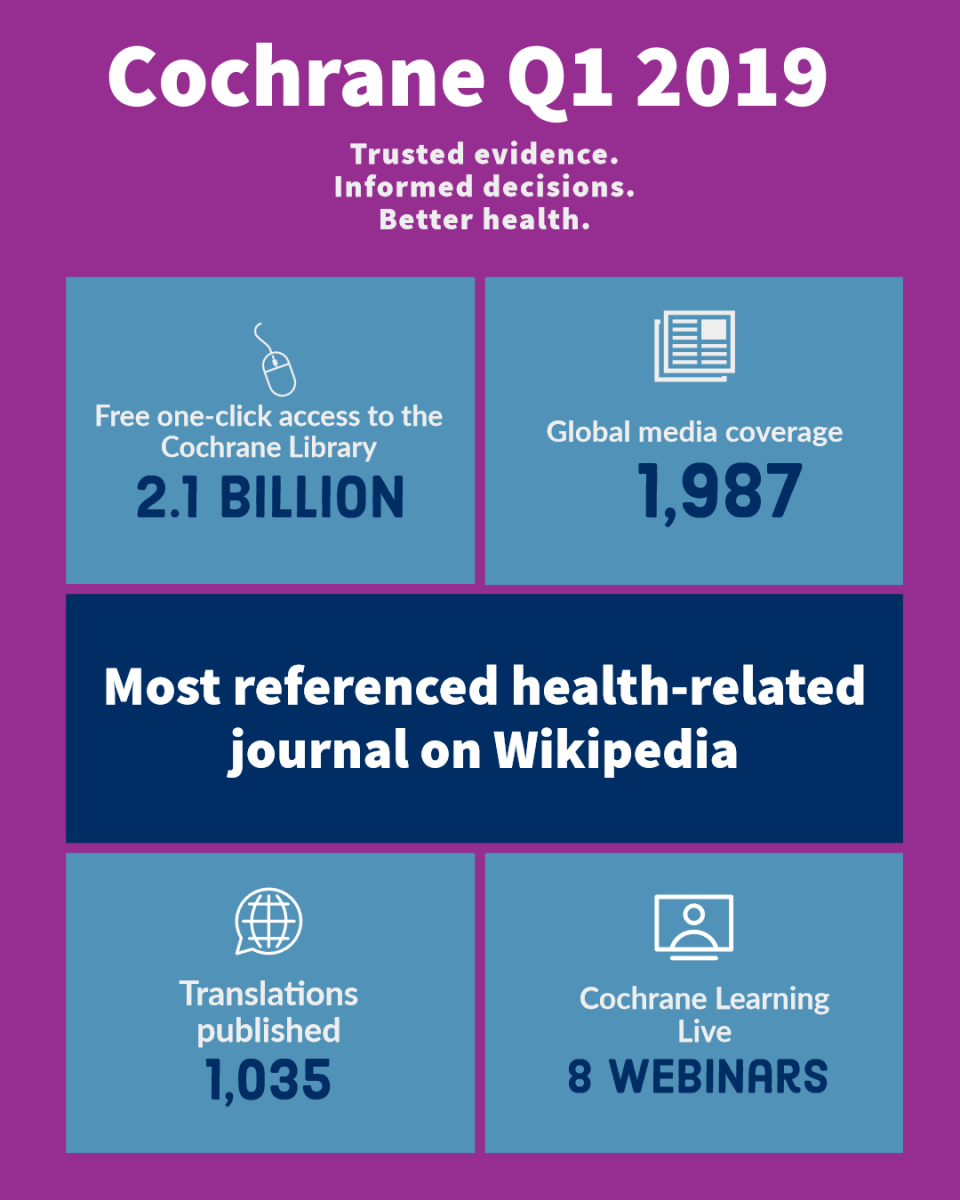
'Cochrane exists so that healthcare decisions get better.’ That is the first sentence of our Strategy to 2020 that aims to put Cochrane evidence at the heart of health decision-making all over the world. Here’s a look back at some key highlights of our work in the first quarter of 2019, from January to March.

Cochrane began preparations for its annual flagship event, Cochrane’s Colloquium in Santiago, Chile 22-25 October, 2019. During this time, many Cochrane contributors submitted abstracts as part of the scientific programme, this year ‘embracing diversity’. We also opened the call for hosts for the second Global Evidence Summit in 2021, a multi-disciplinary and cross-cultural event to exchange ideas about how we best produce, summarize and disseminate evidence to inform policy and practice, and using that evidence to improve people’s lives across the world.
In Q1 2019, we saw the many ways people are using and accessing our health evidence. An international group of researchers found Cochrane Database of Systematic Reviews to be the most referenced health-related journal on Wikipedia. The World Health Organization published guidelines for malaria vector control, drawing on seven Cochrane reviews specially prepared for them by the Cochrane Infectious Diseases Group. We also started a new online series that collects stories about how Cochrane evidence is being used - from in the workplace, in clinical practice, to in everyday life.
We saw our global reach and impact expanded with the Launch of Cochrane Colombia, Cochrane Ireland, a Cochrane Pregnancy and Childbirth satellite group established in the United States. Cochrane’s status as a non-governmental organization (NGO) in official relations with the World Health Organization was renewed at WHO’s Executive Board meeting in January2019. We increased our reach with a younger audience, PhD and med students and early-career professionals with the launch of Cochrane on Instagram. We also delivered training with eight news Cochane Learning Live webinars attracting 548 attendees.

In Q1 2019, we announced that approximately 2.1 billion people have free one-click access to the Cochrane Library. We released two Special Collections: one that highlighted the 'Best of 2018' on the Cochrane Library and another on 'Diagnosing tuberculosis' that was part of World Tuberculosis Day.
 While we published many systematic reviews in Q1, we highlighted 10 Cochrane Reviews with a feature news item on our website, an interview with the author, or a press release. We had 1,987 pieces of global media coverage in Q1 2019.
While we published many systematic reviews in Q1, we highlighted 10 Cochrane Reviews with a feature news item on our website, an interview with the author, or a press release. We had 1,987 pieces of global media coverage in Q1 2019.
- Oral H1 antihistamines as ‘add-on’ therapy to topical treatment for eczema - read this in Malay
- Iodine deficiency disorders; fortification of food and condiments
- Are general health checks beneficial?
- Routine scale and polish for periodontal health in adults
- Very early versus delayed mobilisation after stroke
- Adverse events in people taking macrolide antibiotics versus placebo for any indication - read this in Russian
- Adrenaline and vasopressin for cardiac arrest
- Promoting patient utilisation of cardiac rehabilitation
- Mediterranean-style diet for the prevention of cardiovascular disease
- Press Release - New Cochrane review assesses the benefits and harms of exercise for preventing falls in older people living in the community - read this in French, Japanese, Russian, and Simplified Chinese
 Many clinical areas, diseases, and conditions have annual global awareness days. These are important moments to shine the spotlight on available Cochrane evidence related to this important health topic. Since January 2019, we have disseminated Cochrane evidence as part of the following global health campaigns:
Many clinical areas, diseases, and conditions have annual global awareness days. These are important moments to shine the spotlight on available Cochrane evidence related to this important health topic. Since January 2019, we have disseminated Cochrane evidence as part of the following global health campaigns:
- World Heart Month
- Endometriosis Awareness Month
- Salt Awareness Week
- International Women’s Day
- World Kidney Day
- World Tuberculosis Day
- World Cancer Day
- World Oral Health Day

Cochrane podcast offers a short summary of a recent Cochrane review from the authors themselves. They have been recorded in 33 languages and are brief, allowing everyone from healthcare professionals to patients and families to hear the latest Cochrane evidence in under five minutes. In Q1 2019, we published 11 new English podcasts and 36 podcasts were translated and recorded in 6 languages. You can view and search our entire catalogue of hundreds of podcasts or subscribe via iTunes for the latest updates.
- Which talking therapies work for people who use drugs and also have alcohol problems?
- Routine scale and polish for periodontal health in adults
- Colloids or crystalloids for fluid replacement in critically ill people
- Sedation of children undergoing dental treatment
- Laparoscopy versus laparotomy for the management of presumed early stage endometrial cancer
- Improving the implementation of health-promoting policies and practices in workplaces
- C-reactive protein for diagnosing infection in newborn infants
- Interventions for treating wrist fractures (broken wrists) in children
- Cannabis products for adults with chronic neuropathic pain
- Intramuscular and intravenous opioid pain relieving drugs in labour
- Cerebrolysin for acute ischaemic stroke

- Learn more about Cochrane's mission and work
- Join Cochrane and be part of a global network of more than 78,000 supporters and members
